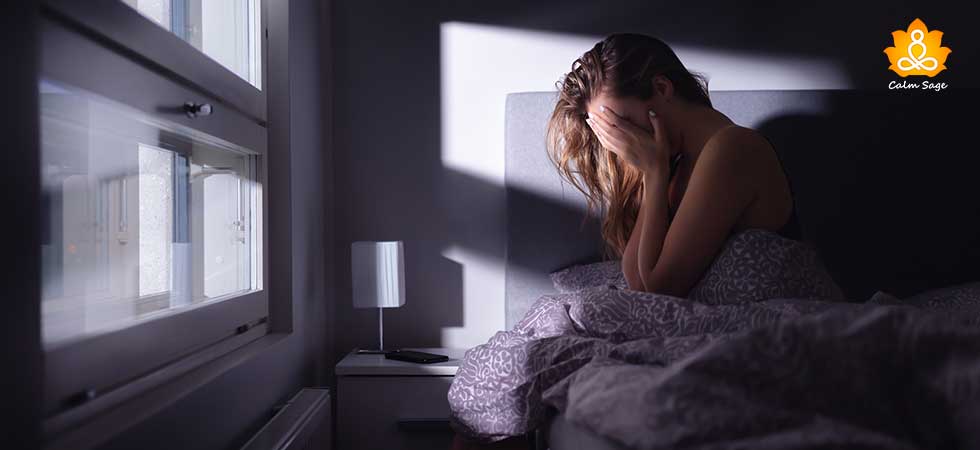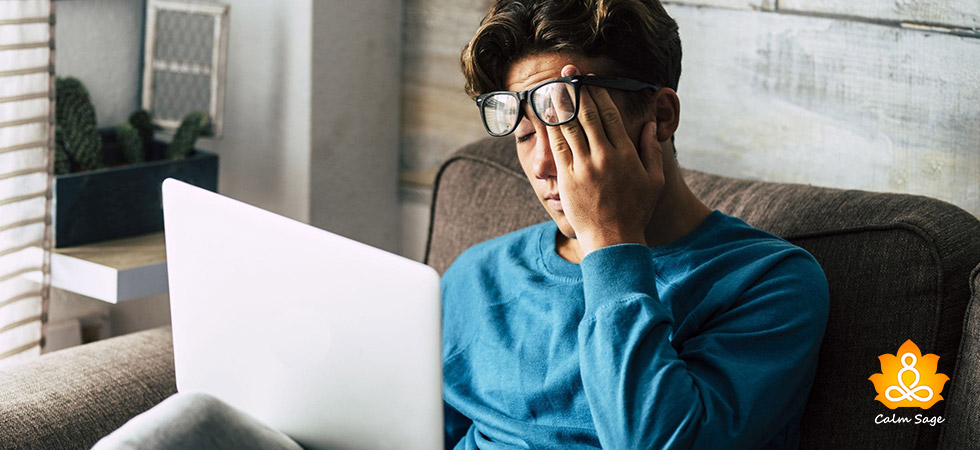Sleep Deprivation and Anxiety: Can Lack of Sleep Cause Anxiety?

We’ve all been there; the tossing and turning in bed, in the middle of the night, trying hard but unable to sleep. Gone are the days when I would stay awake all night (almost!) to work on a project or read – you know? The predicament of “just one more chapter”. But, this was before I knew what lack of sleep was doing to me in my waking time.
The consequences of sleepless nights go beyond feeling groggy and fatigued in the morning. The lack of sleep can take a toll on your well-being and increase the risk of anxiety disorders, panic disorders, and depression.
In this article, we’re diving in to explore more on the connection between sleep deprivation and anxiety, and how lack of sleep can cause anxiety and depression. So, keep reading to find the answers and also tips to break this cycle!
Lack of Sleep And Anxiety: Is There A Connection?
Sleep and our mental health are intricately intertwined. When you constantly miss the crucial 7–8 hours of a good night’s rest, it can impact not only your physical but mental and emotional well-being too.
Your sleep time isn’t just for your body to rest; it’s also the time when your brain recharges and repairs. Without the needed recovery time, your brain can become sensitive to stressors, making you more susceptible to anxiety, panic, and even depression.
Studies show that even one sleepless night can affect your mood and increase feelings of irritability and stress. This is because lack of sleep disrupts the delicate balance of neurotransmitters in the brain, making it harder for you to concentrate and regulate your emotions as they are meant to be.
Here’s an image; Imagine your brain being a crowded street, with each neurotransmitter acting as a medium – a messenger – to guide the ever-growing crowd. When you are sleep-deprived, these neurotransmitters can become confused, causing a chaotic mental state where anxiety can easily stake its claim.
Moreover, when you run on sleepless nights, your body produces more cortisol – the stress hormone. Cortisol can cause physical symptoms such as headaches, muscle tension, and even digestive problems.
Can Lack of Sleep Cause Anxiety and Panic?
Indeed. While occasional sleepless nights can make you highly sensitive to stressors, the real problem arises when sleep deprivation becomes a constant habit. Chronic lack of sleep has been linked to anxiety disorders and even the development of panic disorders such as generalized anxiety disorder (GAD), social anxiety disorder (SAD), and more.
The connection between lack of sleep and anxiety lies in the impact of sleep on the amygdala, your brain’s emotional base. When you are running on sleep deprivation, the amygdala becomes hyperactive and begins to react strongly to anything it perceives as negative. This heightened emotional response can affect the development and even worsening of any existing anxiety disorder.
In a 2020 review, it was found that people with insomnia are more susceptible to anxiety symptoms when they are overly stressed.
If we talk about panic, then it has been reported that people with chronic sleep deprivation experience higher levels of triggering panic attacks. These sudden but intense episodes of fear can be overwhelming and can even manifest in physical symptoms such as rapid heartbeat, shortness of breath, and even experiencing a sense of impending doom.
Sleep deprivation amplifies the stress response. When you are sleep-deprived, the sympathetic nervous system – the one responsible for our fight-flight-freeze response – goes into overdrive. This heightened state can act as a medium for panic attacks, making you more prone to panic attack episodes over a period.
In another 2020 study, it was reported that sleep issues that persist in PTSD and anxiety disorder can lead to an increase in anxiety, and anxiety, in turn, can cause sleep deprivation. Other things that can contribute to sleep deprivation – other than anxiety – can include unhelpful thoughts, negative beliefs, and a lack of healthy sleep hygiene.
So, How to Break This Cycle of Sleep and Anxiety?
Breaking this cycle of sleep deprivation and anxiety might just need more than a single-handed approach. Here are some effective and practical tips to help you regain control of your sleep and mental health;
1. Stick to a Sleep Routine
Setting a sleep schedule by going to bed and waking up at the same time each day can help regulate your body’s circadian rhythm. Doing this and balancing your sleep can promote a better sleep quality.
2. Have a Bedtime Ritual
You can also engage in calming activities and rituals before bed such as reading a book, taking a warm bath, or even taking deep breaths. These sleep rituals can signal to your body that it’s time to rest and sleep.
3. Limit Screen Time
Blue light that emits from your electronic devices can affect the production of melatonin – the sleep hormone. So, try to limit the use of your digital devices. You can also try to avoid consuming caffeine or alcoholic beverages before bedtime, as they can make it harder for your mind to quiet and sleep.
4. Check Your Sleep Environment
Make your bedroom a comfortable place for sleep. Keep the room dark, quiet, free of distractions, and cool. You can also invest in some weighted blankets for anxiety and comfortable pillows for sleep.
5. Live an Active Lifestyle
Regular physical activity during the day can help you improve your sleep and keep anxiety at bay. Try to get at least 30 minutes of moderate exercise most days, but avoid vigorous workouts, especially close to your bedtime, as they can disrupt your sleep.
6. Try Sleep Relaxation
You can also try to add sleep meditation or relaxation techniques to your bedtime routine to help you calm down and relax into sleep. PMR or progressive muscle relaxation, especially, can help lower anxiety and promote muscle relaxation.
7. Consider Professional Help
If your sleep deprivation is becoming a constant issue, then consider seeking help from a professional. A therapist or a sleep specialist can help you figure out the issue, address any underlying problems, and recommend appropriate interventions to help you improve your sleep and lower anxiety.
Wrapping Up…
The relationship between lack of sleep and anxiety and panic is a complicated one, but it also underscores the importance of prioritizing our sleep for our mental and emotional well-being. From the subtle impact on our mood during the day to the risk of anxiety disorders and panic attacks, the negative consequences of sleep deprivation are extreme.
Recognizing the connection between sleep deprivation and anxiety is the first step to take to break free of this intense cycle. Establishing a sleep routine, creating evening rituals, and seeking help when you need it, can help you get restful sleep and calmer days.
I hope this article helped you understand the connection between lack of sleep and anxiety and panic attacks. Let us know what you think about this article in the comments below. If you enjoyed reading this article, then do let us know by giving us a thumbs up!
Take Care and Sleep Well!




















